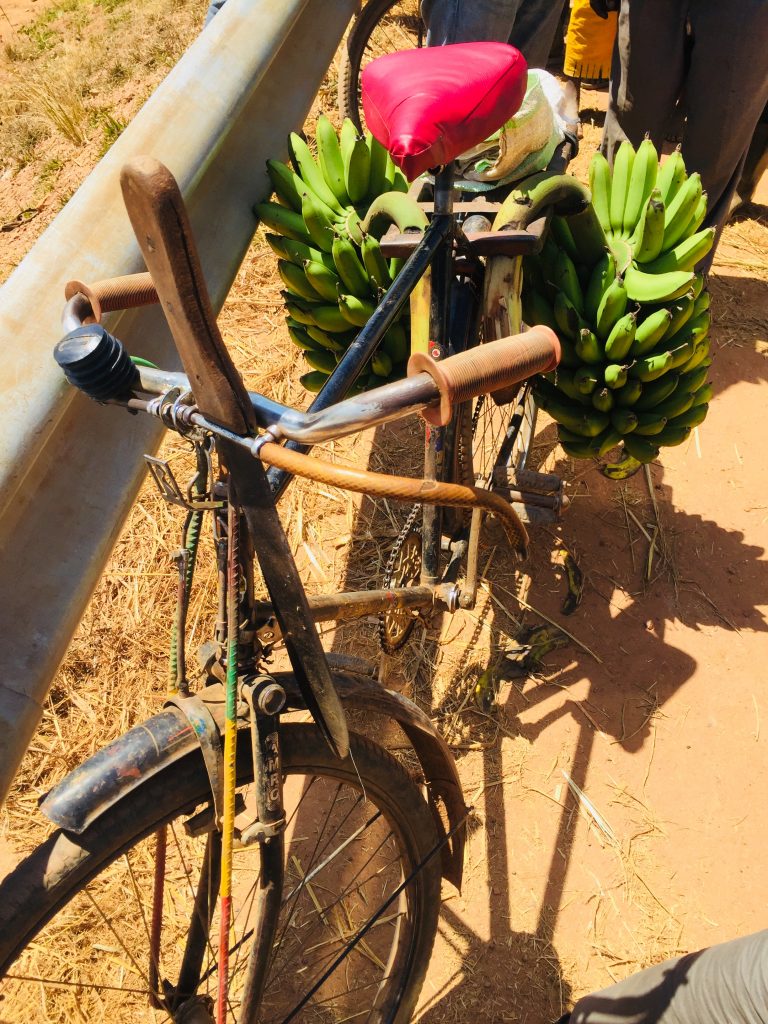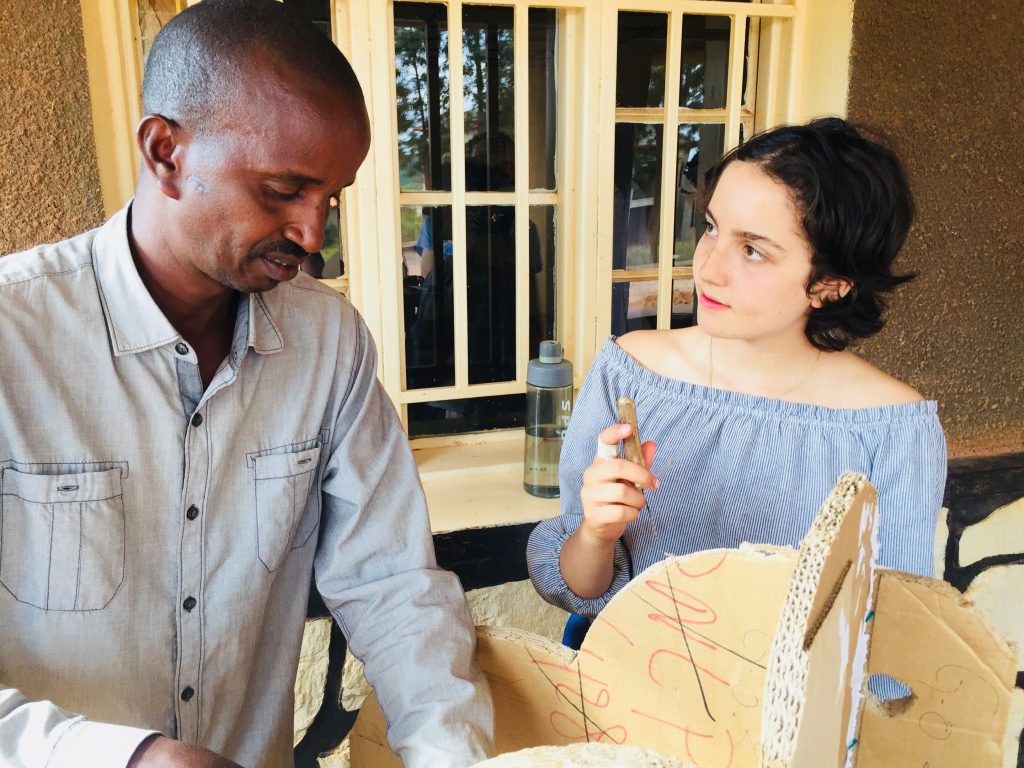“That sap is dangerous,” Theogene manages to tell us in a mix of French and English, motioning up towards the banana tree, its green palms drooping deferentially towards the ground.
“Dangerous?” I repeat, beginning to worry. Theogene points to our shirts and then I understand. The sap won’t come out of our clothes if it drips down the tree while we’re cutting.
Sticky is not great, but I’ll take it over dangerous.
The banana grove at Leya’s house is dense: fifty or so tall trees in a small plot that wraps around the mud-brick house. The house is hidden away by a hedge that’s been cultivated from a prickly bush, tamed to grow just high enough to provide privacy from the road. But the hedge does not stop Leya’s friends and neighbors from pouring into her yard on this warm Saturday morning in July for a special version of umuganda, a kind of community service that Rwandans practice nationwide every last Saturday of the month. In Kigali, umuganda is hard to miss. Silence and stillness replace Kigali’s buzzing fleet of moto taxis and crush of pedestrian traffic. Instead, Rwandans spend three hours or so cleaning up the streets, aiding their neighbors, and contributing to the greater good of their nation.
This Saturday, the Bugesera District Office has helped to organize a special umuganda in Kibungo, about four kilometers from Nyamata, for Leya, whose recent health problems have meant more time at the hospital and less time at home to do chores. The umuganda is special because it’s not the last Saturday of the month, but we have arrived, nevertheless, with sacks of rice and sorghum and cooking oil to leave with her after we have finished some household cultivation chores alongside her neighbors.
In order for banana trees to stay healthy, their dead, yellowing leaves must be severed where they meet the thick green trunk of the tree. Any leaves already bowed towards the ground must also go; relegated to the soil beneath the healthy banana trees, these dead leaves will find new life as the rain breaks them down into an organic mulch. Leaves close enough to the bottom of the tree can be cut off with a machete. Claver, our community organizer at the CECHE Foundation, shows me that the best way to sever the heavy leaf is by swinging the machete upwards underneath the leaf: hack down from the top and the fibrous pink bark will only rip and peel downwards, becoming nearly impossible to cut and creating more problems than it solves. But banana trees are tall, and some of the leaves that must be cut are starting to reach Jack-in-the-beanstalk status. Absent any giants, the best method of cutting those leaves is a tool with a t-shaped blade attached to a fifteen-foot wooden pole. Push upwards with the t-blade to cut these branches from the trunk. The higher the leaves, the harder they fall, crashing to the ground with a soft thwack. The bigger leaves are easily as tall as I am; each time they fall to the ground I marvel at their enormous fronds.
Dispersed in the banana grove, the students cut the leaves and trim the trees, practicing their new skills as more light filters into the garden plot, the canopy of leaves above us thinning as we go along. I find myself with Theogene on the side of the house, cutting in silence. Theogene, a colleague of Claver’s at CECHE, is our main technician for the project we are working on there; he has guided the students through the stages of cutting their cardboard, helping them to transform trash into a useful object for a child who might not otherwise have a chair. In French, I ask Theogene the name of the tree. He responds, and, in turn, asks me if we have banana groves (bananeries) in my home. I shake my head no. Apples, I tell him. But my bananas come from a store.
Most families in Rwanda outside of the cities cultivate their own small kitchen gardens and subsistence crops. Sorghum, maize, bananas (a savory kind, not the sweet ones we might think of when we hear the word “bananas”), Irish potatoes, beans, and ground nuts are popular crops for cultivation.
Theogene, as it turns out, is a natural teacher, both in the workshop at CECHE and in the field here during umuganda. I’m not surprised – he has several children of his own, but he still seems to have endless reserves of patience and kindness that have shepherded us through many afternoons of chair building. After a while, we work alongside each other in silence, but talking with him outside of CECHE has been a small treasure, an unexpected blessing during a day that already feels awash with community and gratitude.


When the morning’s work ends, I take a few moments to stand alone in the banana grove, admiring the persistence of these trees that have grown up in this dry climate. These trees will keep growing after we are gone. They will need to be cut, again and again, so that they can thrive and bear fruit. We’ve stepped in only for a moment, but what a moment it has been. In the spirit of umuganda, we have come together with Leya, her neighbors, and our partners from CECHE for a common purpose. But from the students’ reflections after we leave, it’s clear that the coming together of umuganda is the greater achievement.
–Kayla

